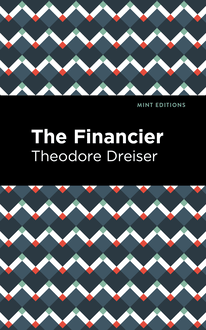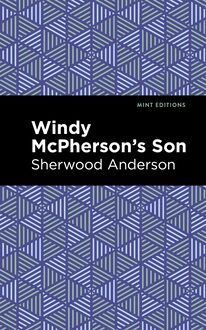-
 Univers
Univers
-
 Ebooks
Ebooks
-
 Livres audio
Livres audio
-
 Presse
Presse
-
 Podcasts
Podcasts
-
 BD
BD
-
 Documents
Documents
-
- Cours
- Révisions
- Ressources pédagogiques
- Sciences de l’éducation
- Manuels scolaires
- Langues
- Travaux de classe
- Annales de BEP
- Etudes supérieures
- Maternelle et primaire
- Fiches de lecture
- Orientation scolaire
- Méthodologie
- Corrigés de devoir
- Annales d’examens et concours
- Annales du bac
- Annales du brevet
- Rapports de stage
La lecture à portée de main

Vous pourrez modifier la taille du texte de cet ouvrage
Découvre YouScribe en t'inscrivant gratuitement
Je m'inscrisDécouvre YouScribe en t'inscrivant gratuitement
Je m'inscrisEn savoir plus
Vous pourrez modifier la taille du texte de cet ouvrage
En savoir plus

Description
Born into the first generation of an immigrant family from Norway, Carl Ericson was always bound to have differing philosophies than his parents. However, when these new, free-thinking ideas result in an expulsion from college, Carl must find a way to fit in with the society’s culture and values without stifling his independence. However, Carl has a difficult time achieving this in the rigid workplace standards of the 20th century. He becomes a vagabond of sorts, jumping from job to job, each making Carl feel suffocated and unsatisfied. Slowly, he feels himself sinking into despair, feeling unmotivated until he hears of a career opportunity in aviation. Excited, Carl begins training to fly airplanes immediately, working long enough to earn the nickname of “Hawk”. Since airplanes were a relatively new invention, flying was highly experimental and dangerous. This hadn’t bothered Carl when he first started, but now, as an older man, Carl begins to worry when he hears the rising deaths in the field. Conflicted and concerned, Carl decides to quit the job. As Carl continues on with his life, he feels that he made the right choice but is still sad to leave the profession. Now back in the same position he was in years before, Carl tries to find a way to champion his individuality and entrepreneurship while managing a new romance.
Featuring themes and topics of immigration, societal expectations, entrepreneurship, love, maturity, and passion, The Trail of the Hawk by Sinclair Lewis is introspective and relatable to a wide audience, including modern readers. With comedy and heart, The Trail of the Hawk is both care-free and serious, capturing attention with its authenticity.
This edition of The Trail of the Hawk by Sinclair Lewis features a new, eye-catching cover design and is printed in an easy-to-read font. With these accommodations, this edition restores The Trail of the Hawk to modern standards while preserving its original heart and mastery.
Sujets
Informations
| Publié par | Mint Editions |
| Date de parution | 16 février 2021 |
| Nombre de lectures | 0 |
| EAN13 | 9781513279305 |
| Langue | English |
| Poids de l'ouvrage | 1 Mo |
Informations légales : prix de location à la page 0,0500€. Cette information est donnée uniquement à titre indicatif conformément à la législation en vigueur.
Extrait
The Trail of the Hawk
Sinclair Lewis
The Trail of the Hawk was first published in 1915.
This edition published by Mint Editions 2021.
ISBN 9781513279206 | E-ISBN 9781513279305
Published by Mint Editions®
minteditionbooks.com
Publishing Director: Jennifer Newens
Design & Production: Rachel Lopez Metzger
Project Manager: Micaela Clark
Typesetting: Westchester Publishing Services
T O THE O PTIMISTIC R EBELS T HROUGH W HOSE T ALK AT L UNCHEON THE A UTHOR W ATCHES THE M ANY- C OLORED S PECTACLE OF L IFE — G EORGE S OULE, H ARRISON S MITH, A LLAN U PDEGRAFF , F. K. N OYES , A LFRED H ARCOURT , B. W. H UEBSCH .
C ONTENTS P ART I T HE A DVENTURE OF Y OUTH I II III IV V VI VII VIII IX X XI XII P ART II T HE A DVENTURE OF A DVENTURING XIII XIV XV XVI XVII XVIII XIX XX XXI XXII XXIII P ART III T HE A DVENTURE OF L OVE XXIV XXV XXVI XXVII XXVIII XXIX XXX XXXI XXXII XXXIII XXXIV XXXV XXXVI XXXVII XXXVIII XXXIX XL XLI XLII
PART I
THE ADVENTURE OF YOUTH
I
Carl Ericson was being naughty. Probably no boy in Joralemon was being naughtier that October Saturday afternoon. He had not half finished the wood-piling which was his punishment for having chased the family rooster thirteen times squawking around the chicken-yard, while playing soldiers with Bennie Rusk.
He stood in the middle of the musty woodshed, pessimistically kicking at the scattered wood. His face was stern, as became a man of eight who was a soldier of fortune famed from the front gate to the chicken-yard. An unromantic film of dirt hid the fact that his Scandinavian cheeks were like cream-colored silk stained with rose-petals. A baby Norseman, with only an average boy’s prettiness, yet with the whiteness and slenderness of a girl’s little finger. A back-yard boy, in baggy jacket and pants, gingham blouse, and cap whose lining oozed back over his ash-blond hair, which was tangled now like trampled grass, with a tiny chip riding grotesquely on one flossy lock.
The darkness of the shed displeased Carl. The whole basic conception of work bored him. The sticks of wood were personal enemies to which he gave insulting names. He had always admired the hard bark and metallic resonance of the ironwood, but he hated the poplar—“popple” it is called in Joralemon, Minnesota. Poplar becomes dry and dusty, and the bark turns to a monstrously mottled and evil greenish-white. Carl announced to one poplar stick, “I could lick you! I’m a gen’ral, I am.” The stick made no reply whatever, and he contemptuously shied it out into the chickweed which matted the grubby back yard. This necessitated his sneaking out and capturing it by stalking it from the rear, lest it rouse the Popple Army.
He loitered outside the shed, sniffing at the smoke from burning leaves—the scent of autumn and migration and wanderlust. He glanced down between houses to the reedy shore of Joralemon Lake. The surface of the water was smooth, and tinted like a bluebell, save for one patch in the current where wavelets leaped with October madness in sparkles of diamond fire. Across the lake, woods sprinkled with gold-dust and paprika broke the sweep of sparse yellow stubble, and a red barn was softly brilliant in the caressing sunlight and lively air of the Minnesota prairie. Over there was the field of valor, where grown-up men with shiny shotguns went hunting prairie-chickens; the Great World, leading clear to the Red River Valley and Canada.
Three mallard-ducks, with necks far out and wings beating hurriedly, shot over Carl’s head. From far off a gun-shot floated echoing through forest hollows; in the waiting stillness sounded a rooster’s crow, distant, magical.
“I want to go hunting!” mourned Carl, as he trailed back into the woodshed. It seemed darker than ever and smelled of moldy chips. He bounced like an enraged chipmunk. His phlegmatic china-blue eyes filmed with tears. “Won’t pile no more wood!” he declared.
Naughty he undoubtedly was. But since he knew that his father, Oscar Ericson, the carpenter, all knuckles and patched overalls and bad temper, would probably whip him for rebellion, he may have acquired merit. He did not even look toward the house to see whether his mother was watching him—his farm-bred, worried, kindly, small, flat-chested, pinch-nosed, bleached, twangy-voiced, plucky Norwegian mother. He marched to the workshop and brought a collection of miscellaneous nails and screws out to a bare patch of earth in front of the chicken-yard. They were the Nail People, the most reckless band of mercenaries the world has ever known, led by old General Door-Hinge, who was somewhat inclined to collapse in the middle, but possessed of the unusual virtue of eyes in both ends of him. He had explored the deepest ca ñ ons of the woodshed, and victoriously led his ten-penny warriors against the sumacs in the vacant lot beyond Irving Lamb’s house.
Carl marshaled the Nail People, sticking them upright in the ground. After reasoning sternly with an intruding sparrow, thus did the dauntless General Door-Hinge address them:
“Men, there’s a nawful big army against us, but le’s die like men, my men. Forwards!”
As the veteran finished, a devastating fire of stones enfiladed the company, and one by one they fell, save for the commander himself, who bowed his grizzled wrought-steel head and sobbed, “The brave boys done their duty.”
From across the lake rolled another gun-shot.
Carl dug his grimy fingers into the earth. “Jiminy! I wisht I was out hunting. Why can’t I never go? I guess I’ll pile the wood, but I’m gonna go seek-my-fortune after that.”
S INCE C ARL E RICSON ( SOME DAY to be known as “Hawk” Ericson) was the divinely restless seeker of the romance that must—or we die!—lie beyond the hills, you first see him in action; find him in the year 1893, aged eight, leading revolutions in the back yard. But equally, since this is a serious study of an average young American, there should be an indication of his soil-nourished ancestry.
Carl was second-generation Norwegian; American-born, American in speech, American in appearance, save for his flaxen hair and china-blue eyes; and, thanks to the flag-decked public school, overwhelmingly American in tradition. When he was born the “typical Americans” of earlier stocks had moved to city palaces or were marooned on run-down farms. It was Carl Ericson, not a Trowbridge or a Stuyvesant or a Lee or a Grant, who was the “typical American” of his period. It was for him to carry on the American destiny of extending the Western horizon; his to restore the wintry Pilgrim virtues and the exuberant, October, partridge-drumming days of Daniel Boone; then to add, in his own or another generation, new American aspirations for beauty.
They are the New Yankees, these Scandinavians of Wisconsin and Minnesota and the Dakotas, with a human breed that can grow, and a thousand miles to grow in. The foreign-born parents, when they first come to the Northern Middlewest, huddle in unpainted farm-houses with grassless dooryards and fly-zizzing kitchens and smelly dairies, set on treeless, shadeless, unsoftened leagues of prairie or bunched in new clearings ragged with small stumps. The first generation are alien and forlorn. The echoing fjords of Trondhjem and the moors of Finmark have clipped their imaginations, silenced their laughter, hidden with ice their real tenderness. In America they go sedulously to the bare Lutheran church and frequently drink ninety-per-cent. alcohol. They are also heroes, and have been the makers of a new land, from the days of Indian raids and ox-teams and hillside dug-outs to now, repeating in their patient hewing the history of the Western Reserve… In one generation or even in one decade they emerge from the desolation of being foreigners. They, and the Germans, pay Yankee mortgages with blood and sweat. They swiftly master politics, voting for honesty rather than for hand-shakes; they make keen, scrupulously honest business deals; send their children to school; accumulate land—one section, two sections—or move to town to keep shop and ply skilled tools; become Methodists and Congregationalists; are neighborly with Yankee manufacturers and doctors and teachers; and in one generation, or less, are completely American.
So was it with Carl Ericson. His carpenter father had come from Norway, by way of steerage and a farm in Wisconsin, changing his name from Ericsen. Ericson senior owned his cottage and, though he still said, “Aye ban going,” he talked as naturally of his own American tariff and his own Norwegian-American Governor as though he had five generations of Connecticut or Virginia ancestry.
Now, it was Carl’s to go on, to seek the flowering.
U NCONSCIOUS THAT HE WAS THE heir-apparent of the age, but decidedly conscious that the woodshed was dark, Carl finished the pile.
From the step of the woodshed he regarded the world with plaintive boredom.
“Ir-r-r-r-rving!” he called.
No answer from Irving, the next-door boy.
The village was rustlingly quiet. Carl skipped slowly and unhappily to the group of box-elders beside the workshop and stuck his finger-nails into the cobwebby crevices of the black bark. He made overtures for company on any terms to a hop-robin, a woolly worm, and a large blue fly, but they all scorned his advances, and when he yelled an ingratiating invitation to a passing dog it seemed to swallow its tail and ears as it galloped off. No one else appeared.
Before the kitchen window he quavered:
“Ma-ma!”
In the kitchen, the muffled pounding of a sad-iron upon the padded ironing-board.
“Ma!”
Mrs. Ericson’s whitey-yellow hair, pale eyes, and small nervous features were shadowed behind the cotton fly-screen.
“Vell?” she said.
“I haven’t got noth-ing to do-o.”
“Go pile the vood.”
“I piled piles of it.”
“Then you can go and play.”
“I been playing.”
“Then play some more.”
“I ain’t got nobody to play with.”
“Then find somebody. But don’t you step vun step out of this yard.”
“I don’t s
Attention
En entrant sur cette page, vous certifiez :
- 1. avoir atteint l'âge légal de majorité de votre pays de résidence.
- 2. avoir pris connaissance du caractère érotique de ce document.
- 3. vous engager à ne pas diffuser le contenu de ce document.
- 4. consulter ce document à titre purement personnel en n'impliquant aucune société ou organisme d'État.
- 5. vous engager à mettre en oeuvre tous les moyens existants à ce jour pour empêcher n'importe quel mineur d'accéder à ce document.
- 6. déclarer n'être choqué(e) par aucun type de sexualité.
YouScribe ne pourra pas être tenu responsable en cas de non-respect des points précédemment énumérés. Bonne lecture !
-
 Univers
Univers
-
 Ebooks
Ebooks
-
 Livres audio
Livres audio
-
 Presse
Presse
-
 Podcasts
Podcasts
-
 BD
BD
-
 Documents
Documents
-
Jeunesse
-
Littérature
-
Ressources professionnelles
-
Santé et bien-être
-
Savoirs
-
Education
-
Loisirs et hobbies
-
Art, musique et cinéma
-
Actualité et débat de société
-
Jeunesse
-
Littérature
-
Ressources professionnelles
-
Santé et bien-être
-
Savoirs
-
Education
-
Loisirs et hobbies
-
Art, musique et cinéma
-
Actualité et débat de société
-
Actualités
-
Lifestyle
-
Presse jeunesse
-
Presse professionnelle
-
Pratique
-
Presse sportive
-
Presse internationale
-
Culture & Médias
-
Action et Aventures
-
Science-fiction et Fantasy
-
Société
-
Jeunesse
-
Littérature
-
Ressources professionnelles
-
Santé et bien-être
-
Savoirs
-
Education
-
Loisirs et hobbies
-
Art, musique et cinéma
-
Actualité et débat de société
- Cours
- Révisions
- Ressources pédagogiques
- Sciences de l’éducation
- Manuels scolaires
- Langues
- Travaux de classe
- Annales de BEP
- Etudes supérieures
- Maternelle et primaire
- Fiches de lecture
- Orientation scolaire
- Méthodologie
- Corrigés de devoir
- Annales d’examens et concours
- Annales du bac
- Annales du brevet
- Rapports de stage
















